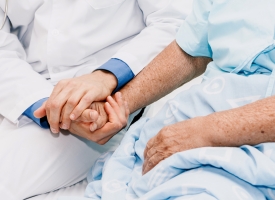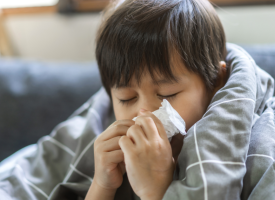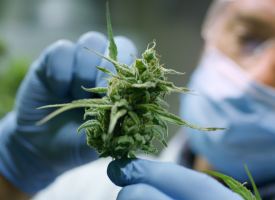The LNP must listen to experts on pill testing
AMA Queensland will work with the LNP government to ensure children’s safety during schoolies. “We are quite disappointed with the LNP to propose to cancel the pill testing… this is not a new issue. This is one of the solutions that we are proposing to keep our communities safe. And I think pill testing is a good opportunity to create that discussion, that education and support for those individuals,” AMA Queensland President Dr Nick Yim told 4BC Radio.

Transcript: AMA Queensland President, Dr Nick Yim, 4BC Radio, Afternoons with Sofie Formica, Tuesday 29 October 2024
Subjects: Pill testing
SOFIE FORMICA: Queensland's new Premier is already getting a taste of what it's like to be in the top job, with the head of the AMA Queensland calling on David Crisafulli to scrap plans to remove pill testing at schoolies. The Miles Government announced back in July that it was going to spend some $80,000 providing pop-up pill-testing clinics on the Gold Coast for next month's end of year celebrations. However, we know during the election campaign the LNP vowed to reverse that decision. Now, as they prepare to take office, the AMA Queensland President Dr Nick Yim is urging Crisafulli to reconsider his position and I'm pleased to say that Dr Yim is joining us on 4BC afternoons. Thanks for your time, Nick.
DR NICK YIM: Always a pleasure.
SOFIE FORMICA: You've wasted no time here. Clearly, because time is of the essence. Why are you feeling so strongly that you would like to see a reversal of his position?
DR NICK YIM: So, as we all know, it's only just around the corner that our high school students, they are finishing their end of year and they're getting ready for their well-deserved break and celebrations. But AMA Queensland, we need to ensure that these children can celebrate safely and we know that unfortunately, during this period of their life, curiosity and sometimes drugs are involved. Which is the reason why we are quite disappointed with the LNP to propose to cancel the pill testing.
SOFIE FORMICA: You know, the argument from the Premier and LNP is that pill testing encourages drug taking.
DR NICK YIM: I think from our perspective, these young adults, these children, they've already contemplated taking this unknown substance. Many of them have already purchased this. And our view is that it's probably better that they have the opportunity to have this tablet tested first, and to also have that conversation with that health care worker on site about substance use.
SOFIE FORMICA: We know at the moment there was also some concerns in particular about synthetic opioids currently in circulation. Just in this last week on afternoons, I had a mum on the show whose daughter took a drug when she was overseas, not realising that it would send her into a psychosis. Are we doing enough to educate? At the same time, what could potentially be inside any pill that you might pick up for 20 bucks?
DR NICK YIM: You're absolutely right. This is a very, very complex problem. You've alluded to already that many of the drugs that we are seeing on the streets, many of these substances, they are synthetic, we just don't know what is in it. At every opportunity, if there's an opportunity for that person to even get that pill tested, but also to have that conversation, to have an education about what is substance abuse, alcohol use, I think that's going to ensure safety for that individual and also the community.
SOFIE FORMICA: I know that this is a broader topic, Nick, but I can't also go without saying this. One of the biggest issues we've got at the moment is also the price of alcohol. A lot of older people who've grown up where alcohol was just a part of growing up, feel like it's something that they, you know, understand, can better control. The cost of drinking now and having a night out drinking is so high that it does push a lot of young people who are looking for that ultimate high, that feeling of doing something a little rebellious to go and spend $20 on a pill, not knowing what it is, rather than knowing that they're going to have to spend $20 on one drink.
DR NICK YIM: Yeah. Absolutely right. Obviously you mentioned the cost of living is increasing at the same time. But I think this is one of those instances for education, support for that individual. Because we know that health itself is a complex issue for individuals who are going out to the nightclubs who are looking for that high, that rush. What are the underlying reasons for that as well? It's a complex discussion.
SOFIE FORMICA: We also have this other law that the LNP is looking to reverse around drug taking. More broadly, if people are caught with a small amount of illicit substance, there was going to be a three-time rule looking at more of a health intervention rather than a criminal intervention. We as a society need to look at drug taking. It's a massive issue for us. It's a massive impost socially. We know that it destroys families, and it is also a huge impost when it comes to the burden on the health department.
DR NICK YIM: You're absolutely right. It's something where I guess drug taking and also addiction, it is a complex issue and there are many harms associated with this. Obviously there’s social harms, there's also the psychological harms to the individual and also friends and family and also the physical harm to that individual. We know many people are presenting to emergency not just with psychosis, but also, overdoses can affect the brain as well. So it's one of these things. We know that mental health is a big issue. So often they use drugs as a coping strategy. So we do need to ensure that, drugs and addiction, it is a health care issue. We want to ensure that people are getting the right support and education to minimise the impact it does when entering the criminal system.
SOFIE FORMICA: So is AMA Queensland’s position then that they will also be pushing about the reversal on the illicit substance use?
DR NICK YIM: Yes, the current drug reforms that we have in place are treating drug use, especially minor position, especially for those young adults, as a health issue. We need to ensure that these individuals are educated. But at the same time, there is a role for that in the criminal system. But that should be the last resort. These are simple methods. All of these things like pill testing. We've got the take home naloxone programme. These are reforms that are helping individuals, but also helping keeping our community safe.
SOFIE FORMICA: I know that there'll be people, though, listening to this conversation, and the first thing that they will suggest is that drug use can often turn to crime issues. And we also have a crime problem.
DR NICK YIM: You're absolutely right. And the thing is, we know that drug use has been around for many years. I grew up in Gold Coast and back in those days there were drugs around, there was marijuana, there was ecstasy, etcetera. So this is not a new issue. I think this is one of the solutions that we are proposing to ensure that it maintains to keep our communities safe. And I think pill testing is a good opportunity to create that discussion, that education and support for those individuals.
SOFIE FORMICA: Well, I don't know where we're going to find the middle ground on this one, to be honest with you Nick, because it does seem like there are two very strong opposing views here. Are you and a lot of health experts feeling very strongly about having this tool in place? You know, if we go back to the original reason for this conversation, to be able to have kids who want to take something, just go and check and make sure that there's not something else in it other than what they've been told or promised. And yet, on the other hand, a very strong push now by a more conservative government that just says we need to be saying no to drugs, we've got to get them off the street, and we need to be doing everything we can to discourage the use.
DR NICK YIM: Yes. And I think it's also really important to acknowledge as well that the early research suggests 16 per cent of people who choose to get those pills tested actually dispose of them on site, which is really huge. And at the same time, 50 per cent of those individuals, when they do get that pill tested, it's actually the first time that they've actually spoken to a health care worker about that drug or alcohol use.
SOFIE FORMICA: Yes, we've got a massive problem on our hands, not one that's going to go away. Really appreciate you jumping on and chatting with me about it today.
DR NICK YIM: No worries. Always a pleasure.



